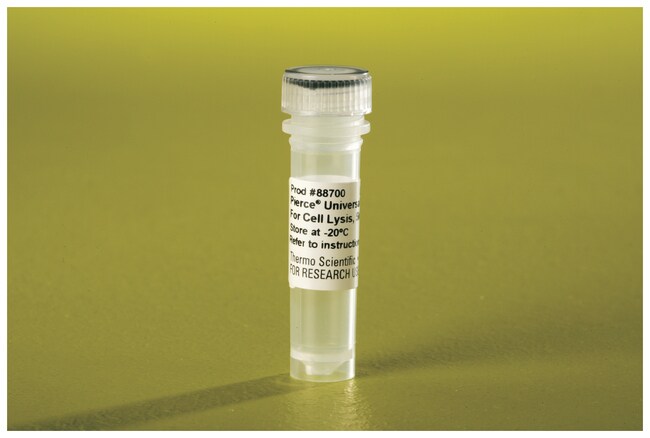
Thermo Scientific Pierce Universal Nuclease for Cell Lysis is ideal for a wide variety of applications where complete digestion of nucleic acids is needed when preparing cell lysates.
Features of Universal Nuclease for Cell Lysis:
• Broad spectrum—degrades all forms of DNA and RNA
• Highest-quality enzyme—nuclease is ≥99% pure, as tested by SDS-PAGE
• Robust activity—100-fold greater specific activity than DNase I
• Versatile—can be used with a wide variety of cell lysis reagents
Pierce Universal Nuclease for Cell Lysis is a genetically engineered endonuclease from Serratia marcescens. The enzyme is produced and purified from E. coli and consists of two identical 30-kDa subunits with two critical disulfide bonds. This indiscriminate endonuclease degrades single-stranded, double-stranded, linear and circular DNA and RNA and is effective over a wide range of temperatures and pH. This enzyme has high specific activity (100-fold greater than DNase I) and increased thermal stability compared to other nucleases. Pierce Universal Nuclease is ≥99 pure enzyme, is free of any measurable protease activity and is supplied at 250U/μL. Pierce Universal Nuclease for Cell Lysis is identical in performance to Benzonase™ Nuclease (EMD Merck).
Applications:
• Use with B-PER, Y-PER or other commercial or homebrew cell lysis reagents and/or mechanical disruption to reduce viscosity in protein extracts
• Remove DNA and RNA from recombinant protein preparations prior to downstream processing
Pierce Universal Nuclease for Cell Lysis is commonly used to reduce the viscosity of bacterial and mammalian protein extracts for downstream application by removing the nucleic acids from protein preparations. The enzyme completely digests nucleic acids to oligonucleotides that are less than 5 bases long. Pierce Universal Nuclease for Cell Lysis helps to improve the separation of the lysate pellet from the supernatant, enhances filtration of the treated lysate, improves chromatography processing time and increases the overall protein yield. The endonuclease has also been shown to improve the compatibility of protein extracts for 2D gel electrophoresis. One unit corresponds to the amount of enzyme required to produce a change of 1.0 in the absorbance at 260nm of sonicated Herring DNA over 30 minutes at 37°C, as determined using standard nuclease from the Merck™ Serratia marcescens volumetric activity assay.
Related Products
Micrococcal Nuclease Solution (≥ 1 unit/μL)
| Code | Description |
|---|---|
| 88700 | Catalog Number: 88700 |
| 88702 | Catalog Number: 88702 |
| 88701 | Catalog Number: 88701 |

